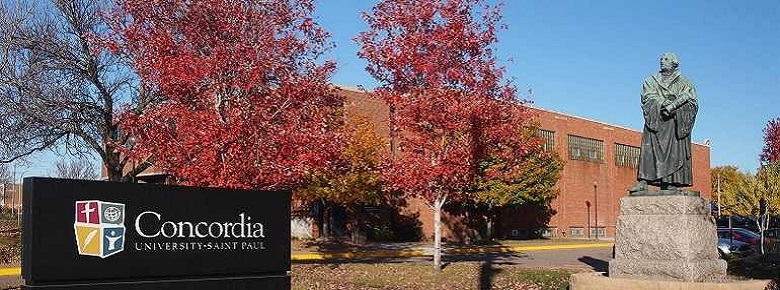When you earn your degree from an online Christian college, you can gain both professional training and greater knowledge about God, the Bible, and theology.

At Christian colleges online, you can learn to integrate your faith into every area of study or work.
Editorial Listing ShortCode:
Whether you want a career in the church or another field, earning your degree from a Christian college can help you get started. Throughout your studies, pursuing faith, growing in wisdom, and honoring God will be top priorities.
Online Christian Colleges
At Christian online schools, you can earn a wide variety of college degrees. Similar to secular universities, these colleges can offer programs in business, education, healthcare, and more. Plus, at a Christian school, you might also be able to major in a faith-based field, such as ministry or Christian counseling or even earn online theology degrees. Examples include the masters in theology online or the PhD in Theology online programs that some of these colleges offer.
Select the program that most interests you to jump to that section of the guide:
- Accounting
- Business Administration
- Christian Counseling
- Communications
- Computer Science
- Education
- Healthcare Administration
- Ministry
- Non-Profit Management
- Organizational Leadership
- Psychology
- Social Work
- Theology
- Worship Arts
Exploring your options may help you determine which academic path is right for you.
Accounting

Businesses and individuals rely on competent accounting professionals to manage their financial records. You can learn the math, business, and computer skills needed for this field by majoring in accounting.
In an accounting program, you’ll generally take courses on cost accounting, taxation, and auditing. You can also learn about information systems used in modern accounting practice. At a Christian college, there might also be a class on accounting principles for nonprofit organizations or churches.
Editorial Listing ShortCode:
Accounting graduates tend to become accounting clerks, auditing clerks, accountants, or auditors. Getting additional education could help prepare you to become a certified public accountant (CPA).
Business Administration

Business majors can contribute to many different organizations’ success, and this program has wide-ranging applications.
In this type of degree program, you’ll likely study concepts in finance, marketing, and human resources. Other classes can cover logistics, global business, and management. You can expect a Christian college to have a course on business ethics as well.
Editorial Listing ShortCode:
Business students may be able to specialize in a particular business discipline, such as marketing, communications, or project management. You could also focus on a particular type of business, such as automotive dealerships or public agencies. Business graduates can end up with a variety of job titles, including marketing specialist, sales manager, or loan officer.
Christian Counseling

If you have a strong desire to help people with their mental health and personal struggles, then a counseling degree may be a good fit for you. In a Christian counseling program, you can learn to incorporate spiritual practices and biblical truths into your counseling practice.
The coursework for this degree might include topics like human psychology, personality theory, and foundations of Christian counseling. Marriage relationships, human development, and mental illnesses may be other topics covered. You might complete an internship, too.
Editorial Listing ShortCode:
Some therapy positions require a graduate degree to become licensed. Some professionals with a bachelor’s program work as case managers or counseling assistants.
Communications

If you value the power of words and using them well, then you might be a good candidate for a position in communications.
The courses in a communications program can teach you how to effectively communicate through oral, written, and digital channels. The curriculum might also address customer service, crisis management, persuasive arguments, and event coordination.
Editorial Listing ShortCode:
Communications graduates sometimes do jobs related to fundraising, public relations, event planning, sales, and media relations. While this degree is relevant for work in both secular and religious organizations, some professionals pursue careers as communications specialists for nonprofit ministries.
Computer Science

Are you fascinated by the inner workings of computers and the principles that govern these machines? If so, then you might consider computer science for your major.
Computer science relies heavily on advanced math and science. You can expect to take courses on geometry, calculus, and physics. A computer science curriculum can also cover operating systems, programming languages, network structures, and databases. Some computer science programs have concentration options related to cybersecurity or web programming.
Editorial Listing ShortCode:
Common jobs in this field include web developer and computer programmer. Some graduates might become computer security analysts, network administrators, or computer support specialists.
Education

If you have a passion for teaching, you might consider a career as a professional educator. Teachers are needed for kids of all ages, and educators can also instruct adults.
No matter which level of students you’d like to teach, you’ll generally study learning theories, classroom organization, and instructional methods. If you plan to become a state-licensed teacher, you’ll also be required to complete a student teaching internship.
Editorial Listing ShortCode:
Teaching majors usually choose a focus area, such as elementary education, middle school, high school, special education, or business training. Jobs for teachers are available in public and private schools as well as church, community, and business settings.
Healthcare Administration

Medical organizations base their operating strategies on business principles. Even still, a basic business degree may not provide sufficient knowledge about the ins and outs of the healthcare world. A degree in healthcare administration could be the solution.
Editorial Listing ShortCode:
To prepare you for effectively managing people, teams, and departments, you’ll often have classes on communication, budgeting, and marketing. The healthcare-focused courses may cover privacy laws, regulatory compliance, and reimbursement systems. Some graduates work as benefits specialists or health services managers. State-licensed professionals could become nursing home administrators.
Ministry

You might want a career that’s focused on sharing your faith or putting your convictions into action. As a ministry student, you can learn to understand the Bible, carry out religious traditions, and serve others.
Editorial Listing ShortCode:
For this type of program, you’ll likely take courses on theology, the Bible, and leadership. You may also learn ministry skills like delivering sermons and counseling parishioners. The concentration options for this degree can involve children’s ministry, preaching ministry, or leadership skills. Common careers in this field include clergy, religious educators, religious activities directors, and nonprofit leaders.
Non-Profit Management

Charities and other nonprofit organizations require personnel with a special set of business skills. A degree program focused on nonprofit management can help you gain the know-how for this sector. Some graduates go on to work in the business office of a community agency or on the leadership council of a parachurch ministry.
Editorial Listing ShortCode:
Your classes can cover laws and ethics related to running nonprofit organizations. You’ll also study business topics like human resources and marketing. Learning about fundraising and grant writing can benefit your organization’s budget. Potential careers for this field include grant writer, fundraiser, nonprofit director, and community service manager.
Organizational Leadership

In both the church world and the business world, organizations rely on strong leaders. You can acquire essential skills for growth and team management when you earn a degree in organizational leadership.
For this program, you might take business classes on finance, human resources, and project management. You could learn about software and other technology tools that can streamline your workplace operations. At a Christian university, you might also study what the Bible says about leadership.
Editorial Listing ShortCode:
Professionals in this field can go on to work in management roles in various business or nonprofit departments, such as operations, outreach, or project development.
Psychology

Are you interested in how humans develop over their lifespan and what influences their behavior? Those are the types of things you can learn in a bachelors-level psychology program. To earn this degree, you’ll take classes that cover topics like abnormal psychology, personality theory, and psychology throughout the lifespan.
Editorial Listing ShortCode:
Your Christian education may also include a course that evaluates psychological theories through the lens of the Bible. Before graduation, you may start to learn about counseling methods. Some professionals with this degree work in human or social services or work as psychology aides. A graduate degree is often needed before becoming a licensed counselor.
Social Work

When people have struggles, where can they turn to for help? Social service programs are often the answer. With studies in social work, you can learn about providing the support and assistance that people need.
Your courses will likely address case management, social work ethics, addiction, and public policy. You can also have field experiences, in which you’ll work with individuals and groups. Social work licensure requirements vary among states. With a bachelors degree in social work, some professionals qualify to become a social service assistant or a licensed social worker.
Editorial Listing ShortCode:
A master’s degree could help you qualify to become a licensed clinical social worker (LCSW) who can offer independent counseling services.
Theology

Theology is the study of God and religious beliefs. If you’re interested in an in-depth exploration of your Christian faith, this degree program could be a fit for you.
You may study languages like Greek, Hebrew, or Latin. In addition, you could learn about biblical interpretation and systematic theology. Your courses can also address historical developments in theology and church teachings.
Editorial Listing ShortCode:
Some people who earn a theology degree go on to become clergy members or church education directors. Plus, many students find that the critical thinking and communication skills learned in a theology major are relevant to a broad variety of professional tracks.
Worship Arts

With a college worship major, you can learn how to use your musical gifts to help others praise God and draw near to him. To enroll in this program, you may need to submit an audition video that showcases your musical abilities.
Editorial Listing ShortCode:
Once you are accepted, you may take classes on music theory, ear training, and piano. You may also study what the Bible says about worship and develop your skills for ministry leadership. Worship arts majors sometimes lead bands or choirs in churches. They may be known as worship pastors or music directors. This degree can also be useful for missionaries.
What Will You Learn at Christian Online Colleges?

At Christian schools, you’ll take classes related to your major, but you may also have a core set of courses related to theology and Scripture. Here are examples of courses you may find at a Christian college:
- Character and Integrity: In a Christian-based ethics course, you can discuss strategies for living out your beliefs and making complicated decisions.
- Christian Worldview: This course introduces you to biblical teachings on God, humanity, nature, and life after death. You can learn how these beliefs should shape your approach to life, work, and relationships.
- Church Doctrine: This class introduces you to the major theological teachings of the Christian church. The curriculum may be influenced by the school’s denominational views.
- Introduction to the Bible: As you survey the Old and New Testament, you’ll learn about the literary genres in the Bible and cover the authorship and dates of various books.
- New Testament: You may spend a semester exploring the Gospels and epistles along with Acts and Revelation. Knowledge of biblical Greek may enhance your studies.
You can often select additional Bible and theology courses as electives.
Pros and Cons of Earning a Degree from an Online Christian University

Some students thrive at religious or evangelical colleges, but that doesn’t mean it’s the right path for everyone. It can be helpful to carefully weigh the following pros and cons as you consider whether attending a Christian college is a good fit for you.
Pros
- The professors may care deeply about their students.
- The programs may prepare you for a career in ministry.
- You can learn to apply your faith’s teachings in any setting or line of work.
- You may be surrounded by likeminded classmates.
- Your studies will foster a biblical worldview.
Cons
- Not all Christian colleges are regionally accredited.
- Non-Christians may feel out of place or may not be granted admission.
- The school may focus mainly on ministry-related degrees.
- The tuition may be higher than at a public university.
- You may not meet as many people with diverse views or experiences.
Religious universities can vary greatly. Some emphasize biblical studies more than others. Also, the cost, rules, student support services, and overall atmosphere can be quite different at each Christian college.
How to Choose a Christian Online College

Since Christian universities can be so different from one another, it’s strategic to make your selection carefully. You may want to consider factors like the ones below:
- Accreditation. Not all Christian online schools choose to seek regional accreditation. Some opt for national accreditation instead. Regional accreditation, though, is more universally recognized, so it can be important for transferring credits or going to grad school.
- Code of conduct. Some Christian colleges expect students to abide by a specific set of rules while in school.
- Denomination. So that the theology will align with your beliefs, you may want to select a school that belongs to your denominational tradition.
- Majors. Some Christian colleges offer only a handful of non-ministry majors, so it’s beneficial to make sure that a prospective school has a program for your chosen field.
Speaking to current or recent students can provide a clearer picture of whether a particular college is right for you.
Admissions Requirements

Getting into a Christian college is similar to applying elsewhere, but there may be a few differences. The following list outlines common application requirements:
- Proof of high school graduation and school transcripts
- References from teachers, work supervisors, or faith leaders
- Statement of faith or personal testimony
- Test scores from the SAT or ACT (not required by all schools)
You may be able to complete the application steps online. Some schools want you to agree with their doctrinal beliefs or write an essay about your own faith journey.
Christian Universities Accreditation

Accreditation is a process in which an outside organization evaluates a college to determine whether the school meets the accreditor’s standards. When you’re searching for colleges, you may hear about national and regional accreditation.
Editorial Listing ShortCode:
The regional variety is the most widely accepted one. Some colleges only accept transfer credits or grad school applications from students who went to regionally accredited schools. Employers, too, often prefer regionally accredited degrees. Since not all Christian colleges are regionally accredited, it can be strategic to research the accreditation status of your prospective school.
Financial Aid and Scholarships

Private colleges can be pricey, but financial aid opportunities may help you bring the cost within reach. You might qualify for a mix of government and private assistance.
Government aid is often available for college students attending accredited schools. It may come in the form of grants or loans. Many students are able to receive both state and federal funds. To start the process, you can fill out the Free Application for Federal Student Aid (FAFSA).
Scholarships are another key source of funding for many college students. You can pursue scholarship funds based on need or merit directly from your school. Private organizations give out scholarships as well. Some, such as the ones listed below, are intended for Christian students or those attending Christian colleges.
- Mary Hill Davis Ethnic/Minority Scholarship Program: Minority students with a desire to serve the local church can apply for this scholarship to select Baptist universities in Texas.
- Robert S. Simmons Christian Studies Scholarship: Any undergraduate student involved in volunteerism and attending a Christian college can apply for this one-time award.
- Ruth Scholarship and David Scholarship: These awards are granted to young Christian women and men who have faced adversity in life.
Your employer might contribute to your school costs, too.
Christian Professional Organizations

Many Christian students appreciate the support of fellow believers. That can extend even to the workplace. To network with other Christian professionals, you might consider joining a Christian organization that aligns with your area of interest.
- Associations for Christians in Student Development (ACSD): If you’d like to work in the student development department at a Christian college, then this organization can provide the necessary support. The membership perks include webinars, research grants, and an annual conference.
- Coalition for Christian Outreach (CCO): Students who feel called into campus ministry may want to join CCO. This organization equips ministry leaders to work on college campuses.
- Fellowship of Christian Athletes (FCA): Whether you’re a player or a coach, you can join FCA for resources related to both faith and athletics.
Joining organizations like these could help you grow academically, professionally, and spiritually. Your participation may lead to relationships with other Christians who support your work and challenge you to serve God in everything you do.
What Is a Christian College?

A Christian college is a school that incorporates the Christian faith into its practices and teachings. Often, these universities are associated with a church, a denomination, or another religious group.
Some Christian colleges offer many Bible courses and focus on ministry degrees. Some attendees of Christian colleges are wondering how do you become a pastor, while others are not. Other Christian colleges offer a wide variety of programs and may have students take only a handful of courses directly related to faith. Even still, a professor in any class may talk about spiritual matters or connect lessons to biblical teachings.
Religious colleges may offer additional opportunities for spiritual growth. Students may have the chance to watch chapel services or participate in campus Bible studies.
Why Choose a Christian University Online?

There are a lot of different schools that offer online degrees. Is there a reason that you should choose an online Christian college instead of a secular one? You may find that there are a number of reasons why a Bible-based college is the right call for you.
- Accredited degrees. Not all Christian schools hold regional accreditation, but many do.
- Biblical classes. In addition to classes centered around theology and the Bible, other courses may address spiritual matters as well.
- Faith-based extracurricular opportunities. As a student at a Christian college, you may get to join an online Bible study or participate in a school-sponsored mission trip.
- Spiritual mentoring. The friends and faculty you get to know may encourage both your professional and spiritual development.
- Training for ministry and other professions. Many Christian institutions offer a variety of degrees so that you can work in the church or elsewhere in the world.
- Worldview development. A religious school might train you to view the world through the lens of Scripture.
While not everyone’s reasons for attending a religious university are the same, you might enjoy attending a Christian college if several of the above benefits appeal to you.
Are Online Degrees Respected?
Yes, online degrees from regionally accredited colleges do garner respect. Whether you go to school on campus or online, the content you learn and the assignments you complete will be similar.
Editorial Listing ShortCode:
At some colleges, the same professors teach the traditional courses and the online ones. Plus, college degrees don’t specify how you enrolled in college. No one who looks at your framed diploma will be able to tell whether you took in-person classes, online courses, or a mix of the two.
Can You Go to a Christian University If You’re Not Christian?

The rules about attending a Christian college if you’re not of the Christian faith vary from school to school. Some colleges welcome religious diversity. Others, especially those that prepare students for ministry careers, may require students to agree to a statement of faith.
Before enrolling, you can explore what faith-based courses you’ll need to take. Being of a different religious background probably won’t exempt you from those classes, so you may want to determine whether you’re comfortable with the requirements. The same goes for campus policies. Christian colleges may have strict codes of conduct, so you can consider whether you can commit to those rules.
What’s the Difference Between an Online Bible College vs. Christian College?
If you tell people that you’re going to a Christian college, they may assume it’s a Bible school. Those two types of institutions aren’t exactly the same, though.
| Christian Colleges | Bible Colleges |
|
|
In general, you can think of Bible schools as a particular type of Christian college.
What’s the Difference Between a Christian vs. Secular College?
If you’re a person of faith, you’ll have a choice to make for your college studies. Do you want to attend a Christian school or a secular one?
| Christian Colleges | Secular Colleges |
|
|
Both types of schools can be regionally accredited.
What’s the Difference Between Christian Colleges vs. Seminary Schools?
Higher education with a spiritual focus is available from both Christian colleges and seminaries, but these two types of schools approach their missions in different ways.
| Christian Colleges | Seminary Schools |
|
|
Some students choose to enroll in seminary for a graduate degree after earning their bachelor’s degree from a Christian college.
Is Attending a Christian College Worth It?

Yes, attending a Christian college is worth it for many students. At a school that’s built on a spiritual foundation, you can cultivate your faith while also earning an accredited college degree.
Editorial Listing ShortCode:
Many religious students appreciate the emphasis that faith-based universities place on the Bible and theology. Plus, earning an accredited college degree can help prepare you for the workforce. According to the Bureau of Labor Statistics, people with bachelor’s degrees generally experience lower unemployment rates than those with only high school diplomas.
Christian Universities Offering Online Degree Programs
Methodology: The following school list is in alphabetical order. To be included, a college or university must be regionally accredited and offer degree programs online or in a hybrid format.

Amridge University offers more than 40 online degree programs that are designed to be flexible for working adults. Bachelor’s degree options include Business Administration, Human Resource Leadership, Information Systems Management, Criminal Justice, Human Development, and Biblical Studies. Applicants can apply by filling out an online application.
Amridge University is accredited by the Southern Association of Colleges and Schools Commission on Colleges.

Anderson University offers a multitude of online and continuous learning educational opportunities. They have programs in arts and sciences, business, Christian studies, education, health professions, and public service and administration. These programs are designed to be flexible and convenient to meet the needs of working students. Anderson strives to maintain a diverse and Christ-centered environment.
Anderson University is accredited by the Commission on Colleges of the Southern Association of Colleges and Schools.

All of Baptist College of Florida’s degree programs are available online. Online courses follow the same semester-based academic calendar as those on campus, which means each course is 15 weeks long, plus exam days. Fields of study include General Education, Business, Music and Worship, Teacher Education, and Theology.
The Baptist College of Florida is accredited by the Southern Association of Colleges and Schools Commission on Colleges.

Bethel University offers world-class online education in a faith-based community. They have a variety of different bachelor’s programs available.
Options include Accounting, Business Management, Christian Ministries, Finance, Human Services, Nursing, Organizational Leadership, Psychology, and Special Education. Some online degree programs include 1 to 2 on-campus intensives each year. Students can also take a mix of on-campus and online classes.
Bethel University is accredited by the Higher Learning Commission.

Brigham Young University offers hundreds of courses online, and students can incorporate online courses into almost any degree program. This can be especially helpful for students who want to complete internships or study abroad. Students can also take blended courses with scheduled meeting times. All courses follow a normal semester timeline to help keep students on track.
Brigham Young University is accredited by the Northwest Commission on Colleges and Universities.

Campbellsville University provides faith-based education with the purpose of helping students become Christian servant leaders. It offers 10 online bachelor’s degree programs, including Business Administration, Criminal Justice Administration, and Elementary Education. Other options are General Business, Leadership and Missions, Liberal Arts and Science, Pastoral Ministries, Special Education, Social Work, and RN to BSN.
Campbellsville University is accredited by the Southern Association of Colleges and Schools Commission on Colleges.

Cardinal Stritch University offers online undergraduate programs in Business Administration, Respiratory Therapy, and Nursing (RN to BSN). Courses are available in an accelerated, 6 week format, which enables students to potentially graduate in as little as two years. These online programs are designed to help busy professionals balance school with other commitments.
Cardinal Stritch University is accredited by the Higher Learning Commission.

Columbia College offers online bachelor’s degree programs in a variety of fields. They have studies in accounting and finance, business, computer and mathematics, general studies, humanities, marketing and entrepreneurship, nursing and health, and social sciences. Columbia’s courses are designed to provide small class sizes, quality faculty, and personalized attention. Columbia is also committed to diversity.
Columbia College is accredited by the Higher Learning Commission.

Concordia University—St. Paul offers online degrees in the fields of business, criminal justice, education, exercise science and allied health, nursing and health care, and social sciences. Online students can receive academic advising and have access to the same resources as on-campus students. Courses are available in an 8 week, accelerated format.
Concordia University – Saint Paul is accredited by The Higher Learning Commission.

Dallas Baptist University has over 75 degree programs that are fully online. Undergraduate degree programs include Biblical Studies, Criminal Justice, Psychology, Sociology, Business Administration, Marketing, Management, and more. Courses are asynchronous and have an average class size of eleven students. The same faculty teaches both the online and on-campus classes.
Dallas Baptist University is accredited by the Southern Association of Colleges and Schools Commission on Colleges.

Grace Christian University offers degree programs that are 100% online. Options include Business, Criminal Justice, Global Communication, Human Services, Leadership and Ministry, Psychology, Ministry, and Organizational Leadership. The degree programs follow a cohort model, with 10-16 students in each cohort. Rental books are shipped directly to students’ homes prior to each course.
Grace Christian University is accredited by the Higher Learning Commission.

Holy Apostles College and Seminary offers many courses online. These courses can be taken in conjunction with some on-campus courses to earn an undergraduate degree. Currently available online offerings include Apologetics, Spiritual Life in the Classics, Rhetoric, Research and Writing, and Humanities in Early Christian and Medieval World. All courses are taught from a Catholic perspective.
Holy Apostles College and Seminary is accredited by the New England Association of Schools and Colleges.

Indiana Wesleyan University offers online bachelor’s degree programs in Business, Communication, Computer Science, Counseling, Criminal Justice, and Education. Other options are Health Science, Leadership, Nursing, Psychology and Social Work, Theology and Ministry. Courses are typically 5 to 8 weeks long, and students take just one course at a time.
Indiana Wesleyan University is accredited by the Higher Learning Commission.

Johnson University offers a variety of Biblically-based online bachelor’s degree programs. Program options include Applied Linguistics, Business Administration, Intercultural Studies, Ministry Leadership, Missions, and Pastoral Care and Counseling.
Courses follow a semester-based academic calendar. Some textbooks are available for e-readers. A maximum of ninety hours of qualifying coursework can be transferred from another university.
Johnson University is accredited by the Southern Association of Colleges and Schools Commission on Colleges.

King University has fully online degrees in English, Communication, Criminal Justice, Healthcare Administration, History, Information Technology, and Psychology. Other options are Religious Studies, Business Management, Social Work, and Nursing (RN to BSN). King University’s degree programs are academically rigorous and rooted in the Christian faith. Many courses are available in an accelerated, 5 week format.
King University is accredited by the Southern Association of Colleges and Schools Commission on Colleges.

LeTourneau University offers a variety of online degree programs. It offers studies in arts and sciences, aviation and aeronautical science, business, education, psychology and counseling, and theology and vocation. Online students have access to a library of educational resources. Classes are taught by experienced faculty and designed to help students earn their degrees around their own schedules.
LeTourneau University is accredited by the Southern Association of Colleges and Schools Commission on Colleges.

Liberty University offers 154 online bachelor’s degree programs in fields such as accounting, aviation, business administration, criminal justice, education, and government. Other options include studies in graphic design, healthcare administration, information technology, nursing, paralegal studies, religion, social work, and sports management. Courses are available in 8 or 16 week formats. Most courses do not require specific login times.
Liberty University is accredited by the Southern Association of Colleges and Schools Commission on Colleges.

Manhattan Christian College offers online programs for a B.S. in Biblical Leadership and a B.S. in Management and Ethics. Terms are 8 weeks long. Courses in both programs are designed to be highly flexible so students can learn anytime, anywhere. The curriculum focuses not only on career training but also on thorough understanding of the Bible.
Manhattan Christian College is accredited by the Higher Learning Commission.

Midwestern Baptist Theological Seminary offers online bachelor’s degree programs in Christian Ministry, Business Leadership, Interdisciplinary Studies, and Biblical Counseling. There are seven 8 week terms each year. Midwestern aims to prepare students for lifelong learning and Biblical application. Online students are given opportunities to come to campus to meet with professors and small groups.
Midwestern Baptist Theological Seminary is accredited by the Higher Learning Commission.

Mississippi College offers several online bachelor’s degree programs. Options include Business Administration, Communication, Homeland Security, Loss Prevention, Nursing (RN to BSN), and Paralegal Studies. MC’s online programs use a structure and format designed for working adults. Applicants must submit high school transcripts and SAT or ACT scores.
Mississippi College is accredited by the Southern Association of Colleges and Schools Commission on Colleges.

Mount Vernon Nazarene University offers online degree programs for working adults in a variety of fields. Options include studies in business, ministry, marketing, education, nursing (RN to BSN), and social work. The online programs feature accelerated classes, cohort models, and faith-based curriculums that teach an ethical mindset.
Mount Vernon Nazarene University is accredited by the Higher Learning Commission.

Newman University offers a variety of online undergraduate degree programs. Options include Business—Data Analytics, Business—Organizational Leadership, Business and Strategic Intelligence, and Interdisciplinary Studies.
The online classes are taught from a Catholic perspective, and their flexible scheduling options are designed with working adults in mind. Online students have class discussions via Zoom, and learning is focused on team collaboration.
Newman University is accredited by the Higher Learning Commission.

Oakland City University offers a variety of online bachelor’s degree programs. Options include studies in accounting, HR management, management, marketing, early childhood education, university studies, criminal justice, and Christian studies. Classes are 5 or 8 weeks long, and student can potentially complete their degrees in less than 24 months.
Oakland City University is accredited by the Higher Learning Commission.

Rosemont College offers two online degree programs: a BS in Criminal Justice and a BA in Applied Psychology. Both programs feature accelerated online courses and can potentially be finished in as little as 2 years. Classes are designed to be convenient for working adults. Students can transfer in up to 84 qualifying credits.
Rosemont is accredited by the Middle States Commission on Higher Education.

Saint Peter’s University is a Catholic university with online degree programs in business, business administration, education, health sciences, and nursing. The curriculum is based on traditional Jesuit values, and the online classes are intended to meet students’ needs regardless of their schedules. Saint Peter’s has an average class size of 22 students.
Saint Peter’s University is accredited by the Middle States Commission on Higher Education.

At Southern Wesleyan University, online students can choose from a variety of different majors. Options are Business Administration, Early Childhood and Family Studies, Early Childhood and Family Studies Management, Human Services, and Religion. Online courses are usually 7 weeks long and are available year round. Christian values are at the center of Southern Wesleyan’s academic programs.
Southern Wesleyan University is accredited by the Commission on Colleges of the Southern Association of Colleges and Schools.

Toccoa Falls College’s online degree programs include Biblical Studies, Business Administration, Counseling in Ministry, Counseling Psychology, and Criminal Justice. Other options are General Studies, Ministry Leadership, Non-Profit Business Administration, Organizational Leadership, Social Work, Sport Management, and Youth Ministry. Toccoa Falls is a test-optional institution, and the curriculum is centered on Christ.
Toccoa Falls College is accredited by the Southern Association of Colleges and Schools Commission on Colleges.

The University of Mary offers online degree programs in business, counseling, arts and humanities, health sciences, and education. There are also degrees available for Catholic professionals. The University of Mary provides an education rooted in Benedictine values to prepare students for becoming servant leaders in their communities.
The University of Mary is accredited by The Higher Learning Commission.

Warner University offers a variety of online undergraduate programs for adults. Options include Agricultural Studies, Business Administration, Christian Ministry, Criminal Justice, Education Studies, General Studies, and Hospitality and Event Management. Classes start every 8 weeks, and students typically take one or two classes at a time. Classes have no set login times.
Warner is accredited by the Commission on Colleges of the Southern Association of Colleges and Schools.

York College offers online bachelor’s degree programs in Business Administration, Psychology, and General Studies. Classes are 100% online and have no required login times. York College features a Christ-centered curriculum and a student-to-faculty ratio of 11:1. Classes start every 8 weeks.
York College is accredited by the Middle States Association of Colleges and Schools.
Getting Your Degree in a Christian College Online

Christian colleges offer a higher education experience that you can’t get anywhere else. The lessons you learn at a religious college may integrate faith with every subject and grow your knowledge about God and the Bible.
You may find inspiration to honor God in everything that you do. Thanks to online studies, you can enjoy the benefits of a Christian college from wherever you are. Online Christian schools that hold regional accreditation produce qualified graduates with respected degrees.
You can start thinking about where a Christian education could take you in life as you search for an accredited faith-based institution.

